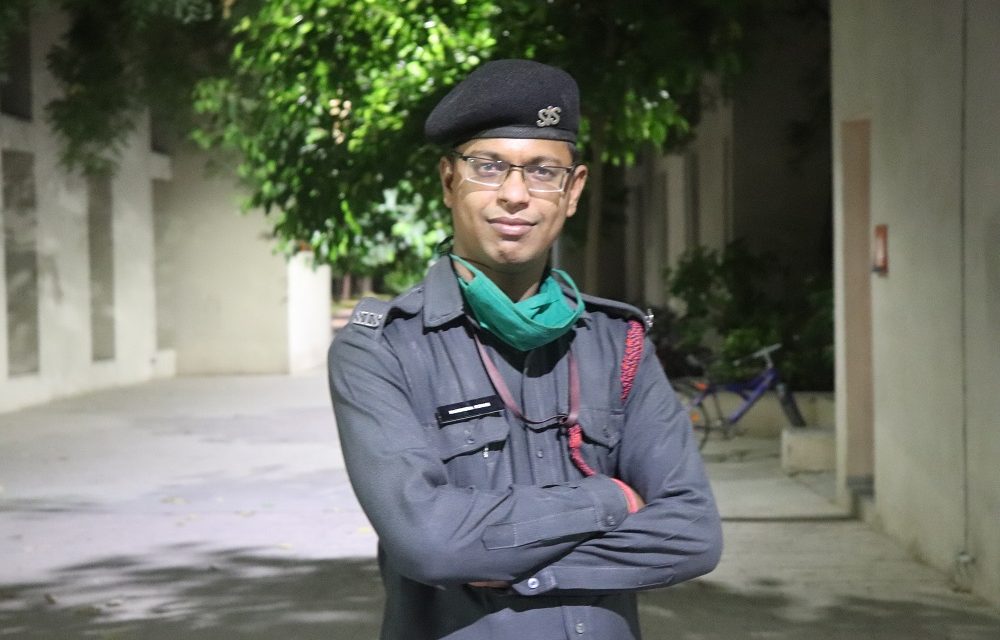“Stay strong. Things will get better. It may be stormy right now but it can never rain forever.” – Anonymous
Narendra Kumar has been a part of the IIT Gandhinagar family for the last four years. A resident of Jerthi village in the Sikar district (Dhod tehsil) of Rajasthan, he completed his B. A. from Rajasthan University.
Narendra is in the security services and works as a security guard at the campus gates, strictly taking care of who enters and leaves the Institute. Sometimes, he is also appointed in the hostel premises to ensure that students are safe and that no stranger can enter their rooms. He has a simple routine – an eight-hour duty every day, after which he goes back to his room on the campus, takes rest, spends some time on social media, and later eats his dinner.
Talking about the novel coronavirus disease, he said that this viral illness is engulfing the entire world at an unprecedented scale and scope. We still do not know many things about COVID-19. He believes that the horrors of this pandemic will not vanish soon and the best way for the public to stay safe is by practicing social (physical) distancing. Moreover, other important practices include wearing masks and washing hands with soap and water frequently. In case soap and water are not available, one should use an alcohol-based sanitizer.
According to him, “The terror of this virus will not come to an end until the world successfully develops a vaccine. In the meantime, the topmost priority of each individual should be to take care of their own health and safety.”
Some more responsibilities have been added to the work schedules of security personnel at IIT Gandhinagar in the wake of the current SARS-CoV-2 infection. The protocol for the entry to and exit from the campus was made stricter since the implementation of the first lockdown by the Government of India. As a result of this, security guards on campus have to be extra careful and ensure that the people are following all the precautionary measures thoroughly. All of them are taking preventive steps thanks to the heightened awareness that prevention is the best strategy, given that no cure is available for this disease in the present times.
Expressing his views on how COVID-19 has affected his lifestyle, Narendra stated, “This pandemic has adversely affected the world not only physically, but economically and psychologically as well. Several organizations and companies in the country are decreasing the number of their employees because they can no longer pay them salaries. Many people are losing their jobs and in times like these, it is very shattering. But this is not the case at this Institute and I am grateful to IIT Gandhinagar for it. We are still able to buy food to eat and take care of our families because we have paid-jobs during this crisis.”
“It is great to do my duty in the current situation. Most of my time goes into it and as a result, life is almost normal for me. The little time I get after work, I try to utilize it well. I feel that this is the reason why I am not much negatively (psychologically) affected by the novel coronavirus disease,” he added further.
He also explained that IITGN takes care of their needs and makes sure that they have access to healthy food, all the basic amenities, and hence, a good life. Following the motto of cleanliness and proper hygiene, the Institute provides them with tidy rooms and washrooms.
Narendra Kumar is thankful to the IIT Gandhinagar family for standing united with him in such times and believes that sooner or later, we will defeat this pandemic, but it can be possible only if we follow the safety guidelines issued by the Government and health authorities of the country.
“Soon, when all is well, you’re going to look back on this period of your life and be so glad that you never gave up.” ― Brittany Burgunder, former tennis player, author, a certified professional coach specializing in eating disorders
— — — — — — — — — — — — — — — — — — — — — — — — — —— — — — — — — — — — — — — — — — — — — — — — — — — —— — — — —
This article is authored by Apeksha Srivastava, with help from Devarsh Barbhaya.

